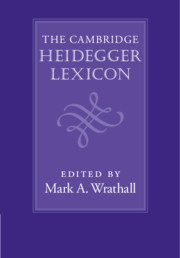Book contents
- The Cambridge Heidegger Lexicon
- Series page
- The Cambridge Heidegger Lexicon
- Copyright page
- Contents
- Contributors
- Preface
- Acknowledgments
- Using the Lexicon
- Chronology of Martin Heidegger
- Abbreviations for Heidegger’s Works
- A
- B
- C
- D
- E
- F
- G
- H
- I
- J
- 119. Jointedness (Gliederung)
- 120. Justice (Gerechtigkeit/Dikê)
- K
- L
- M
- N
- O
- P
- R
- S
- T
- U
- V
- W
- German–English Glossary
- Bibliography
- Index
120. - Justice (Gerechtigkeit/Dikê)
from J
Published online by Cambridge University Press: 17 April 2021
- The Cambridge Heidegger Lexicon
- Series page
- The Cambridge Heidegger Lexicon
- Copyright page
- Contents
- Contributors
- Preface
- Acknowledgments
- Using the Lexicon
- Chronology of Martin Heidegger
- Abbreviations for Heidegger’s Works
- A
- B
- C
- D
- E
- F
- G
- H
- I
- J
- 119. Jointedness (Gliederung)
- 120. Justice (Gerechtigkeit/Dikê)
- K
- L
- M
- N
- O
- P
- R
- S
- T
- U
- V
- W
- German–English Glossary
- Bibliography
- Index
Summary
Justice is ordinarily understood as a juridical-moral condition of rightness or correctness or fairness – for instance, rightness in one’s behavior, or in the substantive effect or application of the law, or in the administration of social institutions, or in the distribution of social goods. But Heidegger was interested in justice understood as a particular style of the unfolding of being – namely, an order of being in an originary sense that is not preset or that overrides all entities in advance of what appears, but that emerges in and through the dynamic fit of oppositional tension between con-junction and dis-junction occurring in the singular joint of appearance (what Anaximander thinks as “genesis,” coming-to-be).
- Type
- Chapter
- Information
- The Cambridge Heidegger Lexicon , pp. 440 - 442Publisher: Cambridge University PressPrint publication year: 2021

